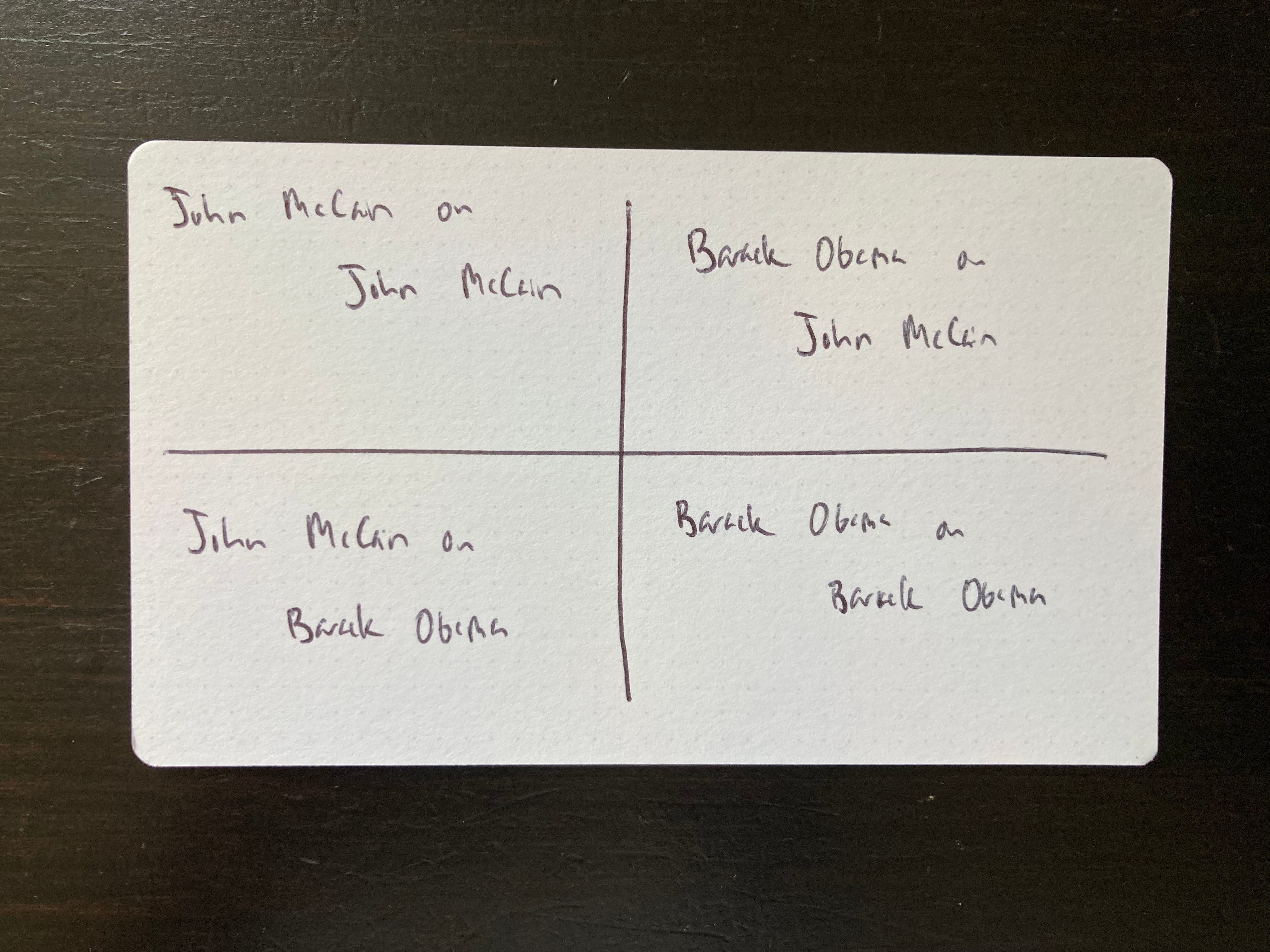The Leesburg Grid is making you and everyone you love miserable
Make this change to your messaging structure if you want to create steady energy
There’s a very straightforward reason we’re all sick of political messaging, advertising, and mailers—and burned out doing the work of self-governance itself.
It’s the Leesburg Grid.
As I remember the story, it’s named for that time when some guys in Leesburg drew up a grid for campaign messaging to create distinctions between candidates.
It’s not clever and it’s making everyone miserable.
Everything about political dysfunction will make sense once you see the structure behind campaign messaging. It’s the reason why every sane person tunes out politics and lets the extremes run the country.
What makes it especially annoying is that “governing is campaigning by different means,” which doesn’t have to be true, but it is, which means the Leesburg Grid is regularly burning out Members of Congress and their staff too.
As you can see in the Leesburg Grid I drew here, it’s a very simple (boring) messaging structure. What does John McCain have to say about himself and Barack Obama, and what does McCain’s campaign think Barack Obama is going to say about Barack Obama and John McCain?
Once you make the endless lists of what goes into each square on the grid, you have your campaign messaging structure.
What makes this structure especially awful is that nothing in the “John McCain on Barack Obama” box has to be true. It doesn’t even have to be believable. It only has to tank likeability numbers so that when voters get their ballots and pick up a pen to mark it, they have general negative feelings about Barack Obama.
As a voter, you don’t have to actually believe that Barack Obama is an inexperienced, celebrity personality who’s also socialist and born in another country. You just have to dislike him enough to not vote for him.
And that’s why the Leesburg Grid is making you and everyone you love miserable.
There’s no story line with the Leesburg Grid. No direction, no problem solving, no journey that we are on together as a country. It’s structural nothing-ness.
John McCain is a strong leader who put his country first and Barack Obama is a socialist. Repeat that often enough and people start to believe it, but it leaves us spinning in circles for no reason.
Distorting the truth through a campaign message and governing plan that intentionally goes nowhere will always lead to burnout. Why would it not?
And everyone who has half a brain will stay on the sidelines, the extremes who actually believe this messaging will stay engaged (until they realize none of it’s real), and we will continue destroying ourselves.
In the case of John McCain v Barack Obama, the Leesburg Grid didn’t work in terms of winning the election. Barack Obama told a significantly better story about who we are as a people, how we could and should relate to each other, and what we could create together.
Barack Obama had a story line that included healing our planet. I volunteered countless hours for John McCain’s campaign and voted for him, and what I remember is that he was an honorable leader who served our country at great cost to himself and was willing to be bipartisan and solve problems.
John McCain was a perfectly solid candidate. With no story line, at least not one that’s memorable, even to me, and I knocked on doors and talked with voters to get out the vote.
McCain’s campaign resorted to making fun of Barack Obama, which was the greatest flaw of the campaign, because it was lame and revealed there was no story.
When I was a Hill staffer and heard David McCullough speak at the Library of Congress, he said that if you say that the king died and the queen died, you have a set of facts. If you say that the king died and the queen died of heartache, now you have a story. Leadership is about telling better stories that make our country stronger, both through messaging and the hard work it takes to govern.
If political operatives want to avoid burning out themselves, their team, and making everyone they love miserable, they need a story structure for their campaigns and time in office. They need to understand their values, story arc, and actually believe what they say, and know that it’s true and life-giving.
If voters want to avoid burnout, it makes sense to start by seeing through what people are saying. Political messaging is created to manipulate how we perceive reality—almost never to serve Americans. Voters should know what their story is too—they hold the power over how we govern. Campaigns can’t do anything without their approval, whether explicit or passive.
Finally, if you feel burned out right now, spend time writing about your own story, beliefs, values, and aspirations.
I’ve poured countless hours into redefining what our value structure in politics could be and understanding story structure, and I believe that we make our country more just and free when we collaborate and build trust. I believe that Lahaina and Sandy Hook and Charleston belong together in one country and that we can make our communities stronger when we believe in the mantra of “Join, or Die.”
Whether I’m working solo or leading a team, that clarity helps me create steady energy to keep going regardless of recovery from a traumatic brain injury—and that’s what I hope is true for you too, so that we can make our country stronger for the next generation.
***
If you want inspiration for your journey to make our country more just and free, get a copy of Liberatus Volume One. If you’d like to work with me 1-1 to write your campaign or brand narrative, write me through my personal site.



